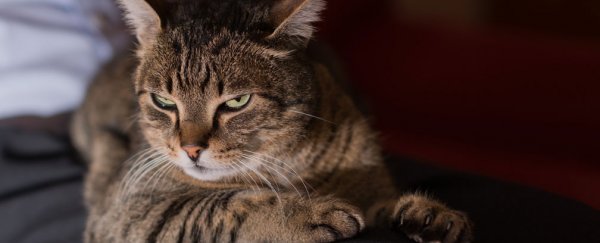You know that thing that cats do when they act all aloof and independent, as if they don't actually care all that much whether you're around? It's not an act.
Research by animal behaviour experts at the University of Lincoln in the UK has found that, unlike dogs, domestic cats don't demonstrate a secure attachment to their owners, meaning they don't derive a sense of safety or security when we're around.
The findings contradict a former study that concluded cats could be just as needy as dogs when it came to human companionship – saying that without it, they may well suffer psychological problems stemming from too much isolation.
"Previous research has suggested that some cats show signs of separation anxiety when left alone by their owners, in the same way that dogs do, but the results of our study show that they are in fact much more independent than canine companions," said Daniel Mills of Lincoln's School of Life Sciences, in a statement to the press. "It seems that what we interpret as separation anxiety might actually be signs of frustration."
To see how cats reacted when their owners weren't around, the researchers adapted the Ainsworth Strange Situation Test (SST), which has been used in the past to demonstrate secure attachments between young children and their primary carer, and between pet dogs and their owner.
But cats? Not so much. The researchers observed the behaviour of cats that had been placed in unfamiliar environments in three separate circumstances: with their owner, with a stranger, or by themselves. In a nutshell, the cats handled things just fine without their lumbering human food servers in attendance.
"Although our cats were more vocal when the owner rather than the stranger left them with the other individual, we didn't see any additional evidence to suggest that the bond between a cat and its owner is one of secure attachment," said Mills.
"In strange situations, attached individuals seek to stay close to their carer, show signs of distress when they are separated and demonstrate pleasure when their attachment figure returns, but these trends weren't apparent during our research."
Rather, the researchers attribute any extra vocalisation the cats made at their owner's absence to either being a sign of frustration or a learned response.
And even if you're convinced that your particular kitty is special and really, truly depends on you – guess again. "As far as we could tell, the cats of owners who considered them to be highly attached did not differ from the others in this regard," said Mills.
Not that cat owners should feel too miffed that Miffy doesn't miss them. If anything, that's a good thing. Because even though it's nice to feel needed every now and then, we shouldn't desire it so much as to wish negative emotions on our furry little friends. And in any case, the research isn't saying our cats don't like us – just that they don't need us to be around to feel okay about things.
"Our findings don't disagree with the notion that cats develop social preferences or close relationships," said Mills, "but they do show that these relationships do not appear to be typically based on a need for safety and security."
The research is published in PLOS ONE.
